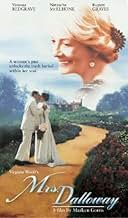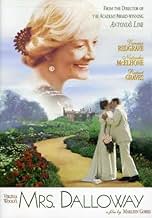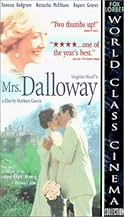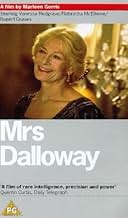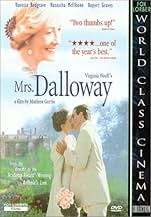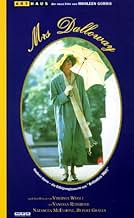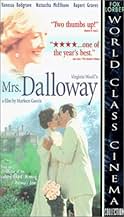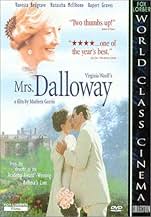VALUTAZIONE IMDb
6,5/10
4419
LA TUA VALUTAZIONE
Clarissa Dalloway, un'attempata signora di Londra, riflette riguardo la propria vita e sulle decisioni prese ingenuamente.Clarissa Dalloway, un'attempata signora di Londra, riflette riguardo la propria vita e sulle decisioni prese ingenuamente.Clarissa Dalloway, un'attempata signora di Londra, riflette riguardo la propria vita e sulle decisioni prese ingenuamente.
- Regia
- Sceneggiatura
- Star
- Premi
- 2 vittorie e 1 candidatura in totale
Recensioni in evidenza
10anelson1
Everyone doesn't like everything, so I'm not surprised that some people find the movie of Mrs. Dalloway boring. They probably would find the book boring too. But it's depressing. So they won't agree with some of us who see the novel as one of the great works of the 20th century, and the film as a truly remarkable and beautiful capturing of it. The only touch I regretted was the opening of the film with the Septimus Warren-Smith war scenes. The opening really belongs with Mrs. D. and her first words, "I will buy the flowers myself." After that moment, it's a quiet day but a beautiful and sensitive one.
I enjoyed this movie very much, although I really loved the novel a bit more, but that's always the case it seems. Vanessa Redgrave and Natasha McElhone make a GREAT older/younger version of each other, and Rupert Graves gives a stellar performance as a young man dealing with the impact of war. This is a gently told tale, but it's done very well. Worth a look.
Like most of Virginia Woolf's literary output, I appreciated the film-version of "Mrs. Dalloway" more than I enjoyed it. There are flashes of blinding beauty in this movie, however, the film's "sum" is not equal to its "parts". Of course, Vanessa Redgrave continues to astound me with her talent. And ---yes, the film is beautifully made and attention to period detail is evident. And --- yes, parts of the story are very heart-rending. Yet.... why does this film satisfy me but not move me? Like a guest at one of Mrs. Dalloway's parties, I am more impressed with the effort that went into the production than the product itself.
Kudos go to all who participated in making this wonderful film. Vanessa Redgrave, as usual, is perfect as an aging dowager who settled for the "safe" path in life instead of seeking adventure and taking risks. When her old flame reappears, she reevaluates her choices and second-guesses the paths that she chose. The film also has a sub-plot about a shell-shocked World War I veteran who is in emotional torment and is inconsolable. The film works on two levels. It shows the interaction between proper British people who speak politely to one another, but the viewer senses that there are fierce and passionate undercurrents and important thoughts that seems to be unspoken. In addition, the film is a clear indictment of the stuffy and snobby British society of Post World War I England, in which a party could be of such importance that a person's reputation could hinge on its success. There is also a feminist slant in the movie. Can a woman who spends her time at home making parties and pleasing her husband ever feel fulfilled? Did Mrs. Dalloway make the right decision in "playing it safe" in life? That is up to the viewer to decide. Meanwhile, revel in the fabulous nuanced performances, the witty dialogue and the beautiful cinematography. This film is a triumph.
Virginia Woolf is thought of as a high-brow rather than popular novelist yet the novel this film is based on sold well when first published in 1924. It is easy to see why there is nothing rarefied in the treatment of its themes, making choices and breaking with the past.
Clarissa Dalloway, a society matron, played with startled radiance by Vanessa Redgrave, is throwing a party and while making the arrangements she remembers back to the choice she made 30 years ago as a young woman between two men. One, Peter, charming, intelligent, adventurous, is the sort who went out and conquered India, or at least seduced the Major's wife. The other, Richard, good-looking, loving, a bit boofy, devoid of flair, is the sort that gravitates into politics. Naturally, the young Clarissa (played by Natasha Mc Elhone) has chosen the safe one, but Peter, after a chequered career, has turned up in London and pays her a call. She invites him to the party. Parallel to Clarisa's reminiscences is the story of Septimus (Rupert Graves) a returned soldier from World War I, whose wartime experiences are eating into his sanity.
Clarisa is put up as a `modern woman' who refuses Peter's love because she sees it as all demanding and all consuming, despite his attractive personality. Yet she accepts Richard, who wants and needs a dutiful, supportive wife. She also passes up the possibility of love with her close friend Sally. Though shaken when she hears of Stephen's fate from his psychiatrist, a guest at the party, and touched when she meets her old lovers again, she sees her life as going on before, safe and unexciting.
For a film-maker the amount of interior musing generated by Woolf's `stream of consciousness' writing technique presents a challenge and here Marleen Gorris has effectively used flashback to externalise Clarisa's memories. We get two stories artfully intercut, though there is not much tension in either of them - costumes, but not much drama. One does, however, get the feel of how it might have been to be in the upper class during the Edwardian late summer; as if just being there was enough (we even meet the Prime Minister at the party). Woolf and Gorris have evoked the atmosphere precisely, even if, as Lytton Strachey said, there isn't much of a plot. Even the minor characters sparkle. Robert Hardy as Sewell's psychiatist exudes bonhomie and guile, and Margaret Tyzak as the meddlesome Lady Bruton gives us a fine example of the old-fashioned female power broker at work. Overall, the film is rather slow, especially at the start, and I did wonder whether it would have been made without all the government and foundation money listed in the credits, but the quality of the performances redeem it to some extent.
Clarissa Dalloway, a society matron, played with startled radiance by Vanessa Redgrave, is throwing a party and while making the arrangements she remembers back to the choice she made 30 years ago as a young woman between two men. One, Peter, charming, intelligent, adventurous, is the sort who went out and conquered India, or at least seduced the Major's wife. The other, Richard, good-looking, loving, a bit boofy, devoid of flair, is the sort that gravitates into politics. Naturally, the young Clarissa (played by Natasha Mc Elhone) has chosen the safe one, but Peter, after a chequered career, has turned up in London and pays her a call. She invites him to the party. Parallel to Clarisa's reminiscences is the story of Septimus (Rupert Graves) a returned soldier from World War I, whose wartime experiences are eating into his sanity.
Clarisa is put up as a `modern woman' who refuses Peter's love because she sees it as all demanding and all consuming, despite his attractive personality. Yet she accepts Richard, who wants and needs a dutiful, supportive wife. She also passes up the possibility of love with her close friend Sally. Though shaken when she hears of Stephen's fate from his psychiatrist, a guest at the party, and touched when she meets her old lovers again, she sees her life as going on before, safe and unexciting.
For a film-maker the amount of interior musing generated by Woolf's `stream of consciousness' writing technique presents a challenge and here Marleen Gorris has effectively used flashback to externalise Clarisa's memories. We get two stories artfully intercut, though there is not much tension in either of them - costumes, but not much drama. One does, however, get the feel of how it might have been to be in the upper class during the Edwardian late summer; as if just being there was enough (we even meet the Prime Minister at the party). Woolf and Gorris have evoked the atmosphere precisely, even if, as Lytton Strachey said, there isn't much of a plot. Even the minor characters sparkle. Robert Hardy as Sewell's psychiatist exudes bonhomie and guile, and Margaret Tyzak as the meddlesome Lady Bruton gives us a fine example of the old-fashioned female power broker at work. Overall, the film is rather slow, especially at the start, and I did wonder whether it would have been made without all the government and foundation money listed in the credits, but the quality of the performances redeem it to some extent.
Lo sapevi?
- QuizFirst screenplay written by Eileen Atkins.
- BlooperIn the flashback scenes with the younger actors, Peter is slightly taller than Clarissa. When they dance together at the party, he is considerably shorter than her.
- Citazioni
Peter Walsh: [Talking about Clarissa in 1923] She broke my heart, and you can't love like that twice.
- Colonne sonoreTime for Old Time
Composed by Jack Trombey (as J. Trombey)
I più visti
Accedi per valutare e creare un elenco di titoli salvati per ottenere consigli personalizzati
- How long is Mrs Dalloway?Powered by Alexa
Dettagli
- Data di uscita
- Paesi di origine
- Lingua
- Celebre anche come
- Mrs Dalloway
- Luoghi delle riprese
- Duke of York Column, St James's, Londra, Inghilterra, Regno Unito(Mrs Dalloway coming back from shopping flowers)
- Aziende produttrici
- Vedi altri crediti dell’azienda su IMDbPro
Botteghino
- Lordo Stati Uniti e Canada
- 3.309.421 USD
- Fine settimana di apertura Stati Uniti e Canada
- 90.127 USD
- 22 feb 1998
- Lordo in tutto il mondo
- 3.309.421 USD
- Tempo di esecuzione1 ora 37 minuti
- Colore
- Mix di suoni
- Proporzioni
- 1.85 : 1
Contribuisci a questa pagina
Suggerisci una modifica o aggiungi i contenuti mancanti

Divario superiore
By what name was La signora Dalloway (1997) officially released in India in English?
Rispondi

